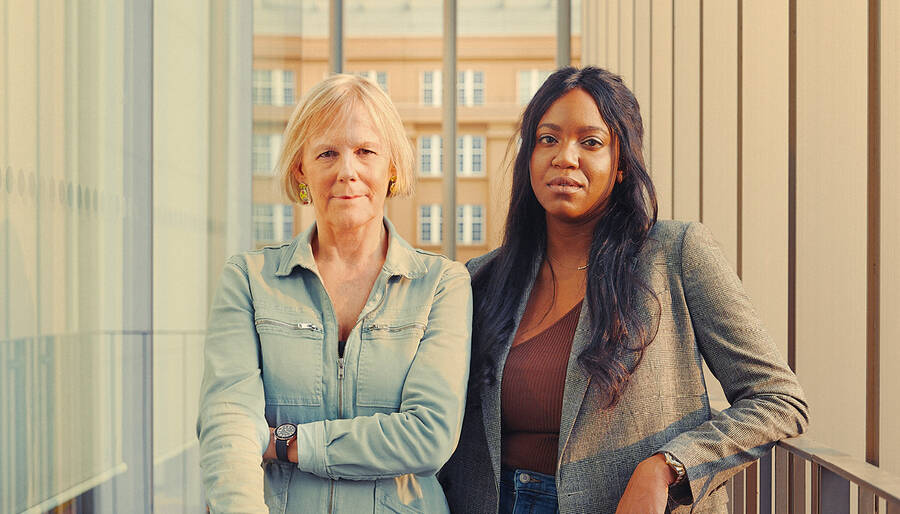Following is an edited excerpt from a conversation between directors Whitney White and Phyllida Lloyd at BAM in Brooklyn at the Adam Space (BAMcafé) in the Peter Jay Sharp Building on Sept. 10, as part of Rolex Arts Weekend, a multidisciplinary arts festival featuring two days of public conversations and world premiere events, including performances, a film screening, and a multimedia art exhibition. Since 2002, the Rolex Mentor and Protégé Arts Initiative has paired gifted young artists from around the world with great figures in their fields, enabling a dialogue across generations, cultures, and disciplines and ensuring that the world’s artistic heritage is passed on personally, from artist to artist.
Lloyd and White, the mentor and protégé in the theatre discipline this cycle, spoke with Rebecca Irvin, head of the Rolex Institute, following the world premiere of White’s The Case of the Stranger. Created during her mentorship, Case in the vein of her earlier piece Macbeth in Stride (commissioned by American Repertory Theater as the first in a series of works), in that it is staged concert combining Shakespeare’s words with White’s original text and music. The title, taken from a passage attributed to Shakespeare, is one of the earliest known and most impassioned defenses of a compassionate refugee policy. The performance explores themes of immigration, borders, and crossings, and the celebration that unexpected human connections can ultimately bring.
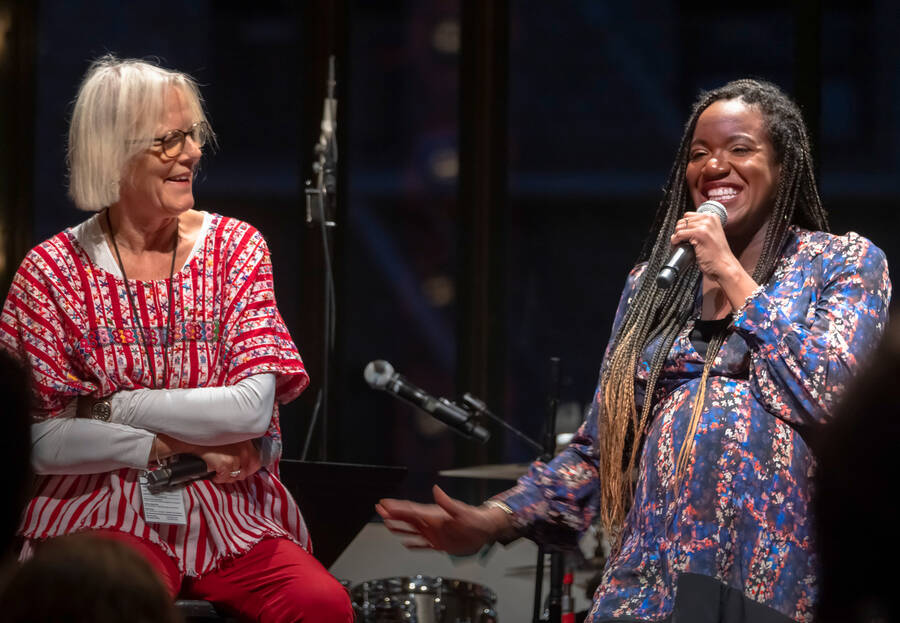
The 2020-2022 cycle of the Rolex Mentor and Protégé Arts Initiative also featured mentor Spike Lee and his protégé, Kyle Bell, in film; mentor Lin-Manuel Miranda and his protégé, Agustina San Martín, in the open category; and mentor Carrie Mae Weems and protégé Camila Rodríguez Triana in visual arts.
REBECCA IRVIN: Whitney, you wrote this piece specifically for Rolex Arts Weekend. In a way, it came out of your mentorship with Phyllida. Can you say how it came about? Apparently, this is a text that even you, the Shakespeare nerd, didn’t know existed.
WHITNEY WHITE: I’ve been working on a series of texts that evaluate Shakespeare’s world from the female perspective concerning ambition, and how deadly it is to be a female with ambition. And I was like, “Let me do one of those ladies for this.” Phyllida and I have been having these amazing conversations about everything, borders and crossings and audience and everything, and she said, “Have you heard of this speech?” I hadn’t. It’s attributed to Shakespeare—I’ll let Phyllida talk about where it comes from—but it’s called “The Stranger’s Case.” It’s this monologue, and it’s incredible. I urge you all to read it; it just reads so contemporary. It’s an argument for empathy for strangers, no matter what situation they’re in.
PHYLLIDA LLOYD: It just came from a kind of Shakespearean writers’ room, and they think that Shakespeare wrote this particular speech. Ian McKellen had recorded this speech, and just at the time [the U.K.] were planning to send our asylum seekers to Rwanda, I sent it to Whitney and thought it might be a spark of something.
WHITNEY: It was so moving, and I was just very inspired. All of the music we’re working on in our show is inspired by lines from the monologue, but also headlines that we’ve all heard lately that just directly intersect with the language. Sadly, unfortunately, these stories don’t stop, about lack of empathy for people traveling. But I didn’t want it to all be dour, so I also tried to think of the word “traveler” in a more abstract way. We’re all travelers.
REBECCA: Shakespeare is a point of connection for you both, especially Shakespeare viewed from a woman’s perspective. Do you want to comment on that a little bit?
WHITNEY: I mean, Phyllida has made, I think, one of the greatest contributions to contemporary Western interpretation of Shakespeare with her canon of work with women. I knew that work before I met her, and it changed my life to see all of these characters embodied by women.
PHYLLIDA: I think one of the things that drew us to each other was our feeling that on both sides of the Atlantic, we’ve missed the point of Shakespeare, probably since around 1900, when we started turning it into a kind of heritage industry rather than trying to capture the contemporary, raw danger of the original use of the text. We’ve been doing it in period costume and just getting the wrong end of the stick. And Whitney was doing something really, really radical with Macbeth that spoke to me very much.
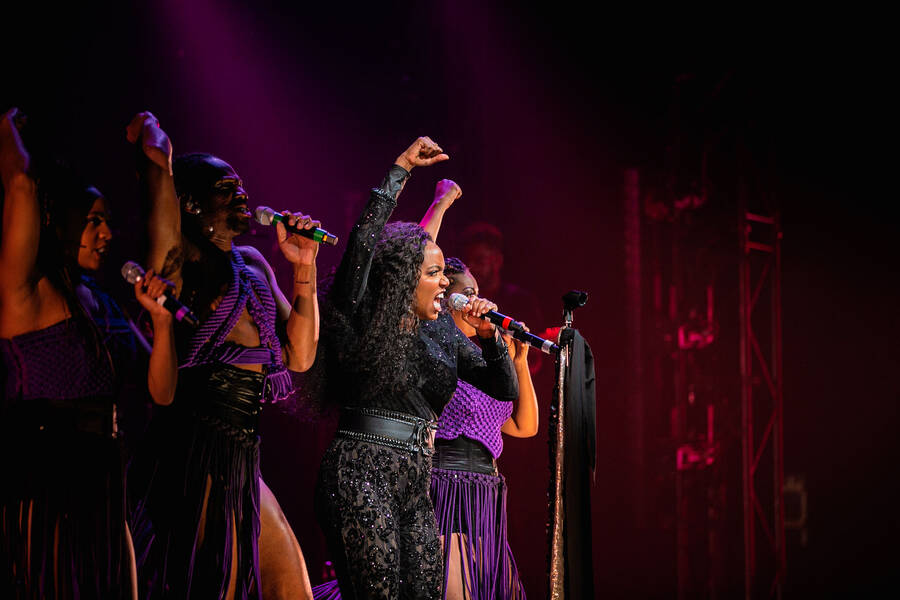
REBECCA: Tell us about your use of Shakespeare from a woman’s perspective.
WHITNEY: All the ladies I love in these Shakespeare plays, they don’t live to see Act Five. And I was like, “How come all my ladies die by the end of the play?” I started analyzing several texts: Romeo and Juliet, Antony and Cleopatra, Macbeth, Ophelia in Hamlet. In my opinion, if you are too ambitious in Shakespeare’s world—maybe he’s trying to get us to think about this—if you’re ambitious for power or ambitious for love, you might not live to see Act Five. I started analyzing these texts with different musical genres: Macbeth sounds like Tina Turner and The Doors to me, and Romeo and Juliet kind of sounds like Blondie and disco, and Cleopatra feels like Prince, like “Purple and Gold,” you know? But I don’t want to use those people’s music because that would be very expensive. So I started composing my own music in the vein of, or inspired by, this music. And so these concert plays are put together with music and text and contemporary perspective.
REBECCA: Let’s talk about music for a minute, because music is also a big part of your relationship and something I think that you share. Whitney, you compose, perform, and direct. And Phyllida, you’ve directed opera, the Mamma Mia film, and now the Tina Turner musical on Broadway. How has music been a point of connection between you and your work?
PHYLLIDA: It’s been a big connection. And we did talk at one point about, before the pandemic struck, about going to Jamaica because of Whitney’s heritage and wanting to go and maybe make a film. That’s maybe to come.
WHITNEY: We have a problem across the arts—not to get too preachy, but we have a problem with audience. Our audiences are aging. I always joke that I could direct a really fancy play in midtown and It’d be like, “I have free tickets,” and my friends would be like, “I’d rather go to brunch.” You know? But I can be like, “I have a random friend who’s playing a show, a concert at Elsewhere, and it’s 80 bucks.” And they’re like, “Yeah, we’ll go.” What is it about concerts and music that make people still more willing to just go experience art? And what does theatre need to do to get closer to that?
PHYLLIDA: I think it’s something to do with the well-made play and knowing it’s got a beginning, a middle, and an end, and when are we going to eat? I think it’s about participation. And music just makes us step into the space in a way that with a play is very hard, especially now when we have had this experience of being at home and being so entertained in our homes during the pandemic.
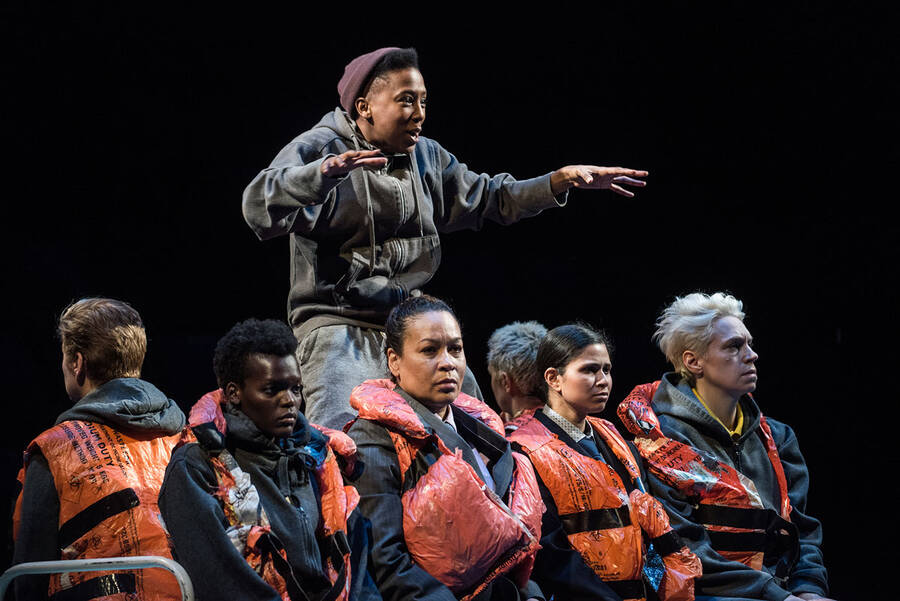
REBECCA: Let’s talk about that for a minute. Obviously, so much has happened in the last few years and it’s been so challenging for everyone in the arts, particularly the theatre. Can you each address how the last couple of years and everything we’ve been through has changed your role and your practices?
PHYLLIDA: The show did not go on—and the world didn’t end. I think that had a profound impact on artists, performers, actors, their relationship to the stage. There’s a lot of trauma in the rehearsal room. Something has been broken. And that’s why, I think, we have to look to the buildings in which we ask people to leave their homes to come to. Are we making the right invitation to people to leave their homes now? What’s the offer? I think we’re in a bit of a siege at the moment with our work as to how to reconfigure.

WHITNEY: We have a labor shortage, because a lot of people in this time decided, maybe I don’t want to return to that kind of work, or maybe the price is too high and what I’m getting back isn’t enough. My body is tired. We make theatre; we’re so lucky. We’re not curing a disease or anything, but it can be quite grueling. It can be seven days a week. I think people had time to reevaluate their lives. I myself did have a lot of change going on, and people are asking themselves, what’s worth my labor? And I think if we don’t rethink how we care for these technicians and people, we will continue to lose people.
REBECCA: So let me ask you, what would you tell this audience tonight about why they should go back to the theatre?
WHITNEY: We can’t tell you. We’ve got to make the stuff that makes you want to break the door down to get to it. That’s what we’ve got to work out. We have to make stories or put stories up that you want to hear again, and not just hear again, but hear live with people and not alone in your home. I think the pressure’s more on us than you.
REBECCA: Whitney, you have your first show in the U.K. opening next spring, The Secret Life of Bees at the Almeida Theatre, correct?
WHITNEY: I’m very nervous and excited. My family is here [in New York], and some of them live in London. I will be relying on them for emotional support.
REBECCA: How important is it for you to work internationally now? You’ve made a name for yourself here, particularly in this town. How do you see your future internationally and how important is that for you?
WHITNEY: Well, I mean, even in my own family, I think if you stay too entrenched in your own pond and your own provincial way, it’s hard to get perspective and find stories that appeal to everyone. I’ve always dreamed of being able to make work that can speak to lots of people in different languages. That’s why this program has been amazing, because it helped me feel that it’s possible. It’s so cheesy to say “reach across the pond,” but it feels really important to not just be having the same conversation. I love New York, I love Brooklyn, but sometimes it feels like you’re having the same conversation with the same 10 people, and you start to feel very safe and you’re entrenched in your niche politic. I don’t think that’s the point of art. I want to get out of that and see if my stories can connect people and connect me to other people, to people very different than me, you know?
REBECCA: And Phyllida, you’ve been here working on the U.S. tour of Tina. What’s next for you?
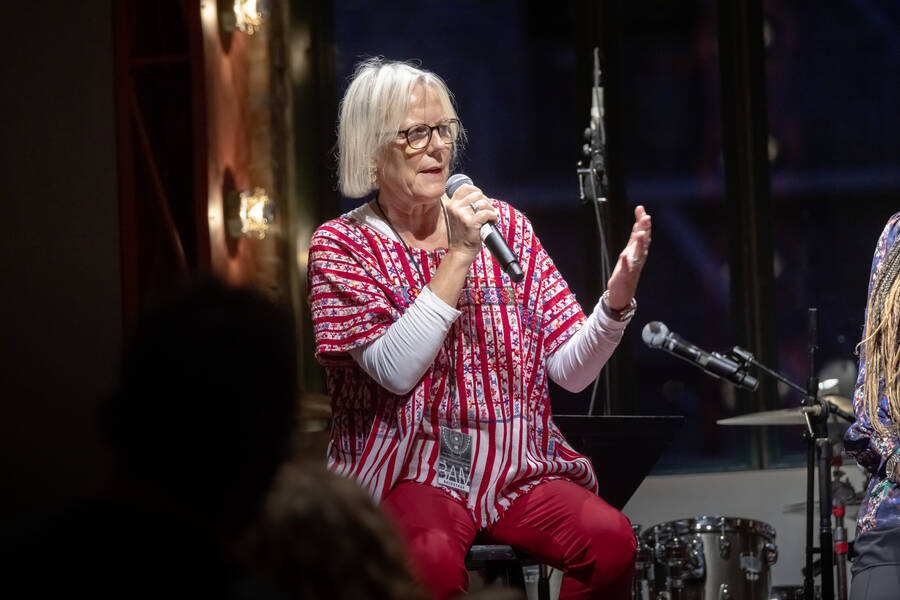
PHYLLIDA: I’m going home to work on a verbatim project. It’s not a play, it’s a “state of the nation” piece of theatre, a big community project.
REBECCA: I will ask you each one question about the mentorship, which is: Can you tell us in one sentence the main thing you learned from working with each other? I’ll start with Phyllida. What did you learn from Whitney over these last couple of years? It’s been more than two years, actually, since you were announced as the pair in theatre.
PHYLLIDA: So many things. Where to eat and drink in many cities!
WHITNEY: My partner is laughing; he calls them my “snack diaries” because I’m always talking about where to eat. So now he’s vindicated.
PHYLLIDA: But seriously, at a time when we’re all questioning who should be telling what stories—who has the right to tell whose story? I was particularly exercised and anxious about my relationship to the telling of the Tina Turner story and the African American experience that lies at the heart of it, and whether it’s time to move away from the table in certain areas. And Whitney just said words to the effect of, “Make space at the table, but don’t walk away from it, because we need your generation.” Sorry, you said one sentence!
REBECCA: Whitney, what have you learned from Phyllida, do you think?
WHITNEY: Look at her. This woman has achieved just staggering things in every performative field as a director. And yet she keeps herself together, makes people feel very human around her, and has a beautiful life. I feel like there’s something very holistic from Phyllida I’m trying to soak up, about finding balance in one’s life, and that you can still make the art without the chaos, and you can walk into a room balanced and still do your best. She’s kind of burst so many myths of ego and personality, all of those things you hear about in the arts. That’s what I’m really taking from her: Just keep yourself together. You can find balance and you can still do your best work.
REBECCA: One more question, are the two of you planning on collaborating on a project together in the future?
WHITNEY: We have schemes.
PHYLLIDA: We’re coming to you with our budget.
Previous AT coverage of Rolex Arts theatre mentors and protégés is here.

